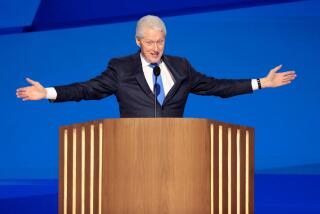Richardson hints at new diplomacy
- Share via
For a little while Tuesday it looked like Bill Richardson was back in one of his job-interview political ads, applying this time for a different opening -- vice president, say, or secretary of State.
Richardson, the New Mexico governor and former Democratic presidential contender, was the keynote speaker at a symposium on rogue nations hosted by UCLA’s Ronald W. Burkle Center for International Relations.
The gathering also featured retired Gen. Wesley K. Clark, the former NATO supreme allied commander who mounted his own presidential bid in 2004 and who also has been mentioned as a Democratic vice presidential contender.
Both men’s comments, delivered during different parts of the program, offered a window into what U.S. diplomacy might look like should the Democrats win the White House in the fall.
The key: more talk.
Dipping into his presidential stump speech, Richardson urged the U.S. to return to what he described as active engagement with the international community. He backed Sen. Barack Obama’s position that the U.S. should meet with enemies as well as friends.
Despite the closeness of their positions, Richardson, a former ambassador to the United Nations, declined to endorse either Obama, of Illinois, or Sen. Hillary Rodham Clinton of New York. Clark has endorsed Clinton.
And despite urging more international contacts, Richardson drew the line at negotiating with terrorist groups such as Al Qaeda.
“There are some terrorist elements that it’s fruitless to talk to them because their objective is to topple you, kill you,” Richardson said in a session moderated by Maggie Farley, The Times’ United Nations bureau chief. “So you talk to their suppliers. You talk to those that control them.”
That means talking directly with such nations as Iran and Syria, which the U.S. believes sponsors terrorism, as well as the Saudi Arabians “who financially support Al Qaeda elements,” Richardson said.
Richardson urged the government to adopt “personal diplomacy,” forging ties among international leaders that can be drawn on during times of crisis, and to pressure countries that act contrary to international desires.
Richardson also said the U.S should find connections with sympathetic opposition leaders and groups in places such as North Korea and Iran.
“I would engage others in Iran first but if it means talking to [Iranian President Mahmoud] Ahmadinejad, I would do it,” Richardson said.
Clark, a senior fellow at the Burkle Center, also supported isolating terrorist groups. “We have strategies to work against these people,” Clark said, speaking on a panel that asked members what foreign policy advice they would give the next president. The panel was moderated by Times Washington bureau chief Doyle McManus.
Clark suggested a shift from the Bush doctrine of preemptive war.
“It’s a pretty expensive, difficult road to go down and it doesn’t necessarily make you safer,” Clark said. “Preventive war? No, I think we’ll back away from that, if we’re wise. The big idea will be to work with others.”
Clark added: “The United States has been through a tough time. But if we don’t make more friends and fewer enemies in the world, we’re going to see our power further constrained.”
--
More to Read
Sign up for Essential California
The most important California stories and recommendations in your inbox every morning.
You may occasionally receive promotional content from the Los Angeles Times.











